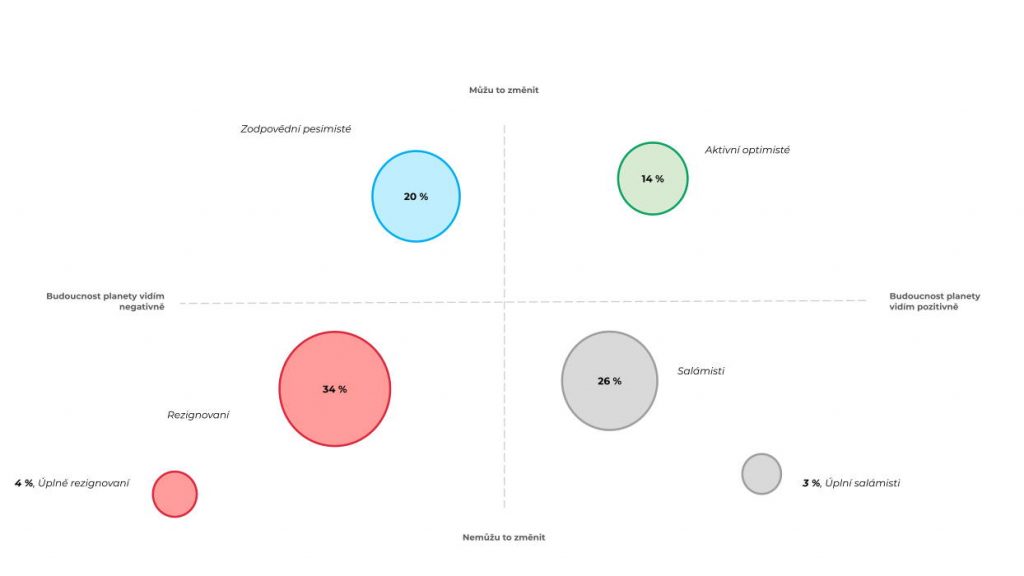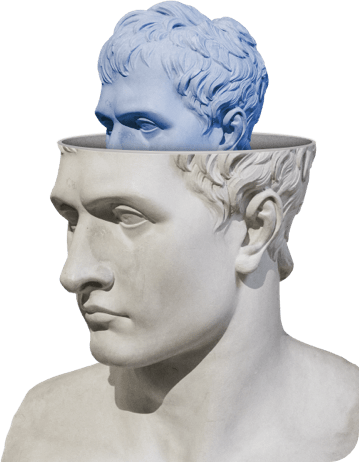Czechs: nothing will stop us from eating meat!
-
 Vojtech Prokes
Vojtech Prokes
- 1. March 2022
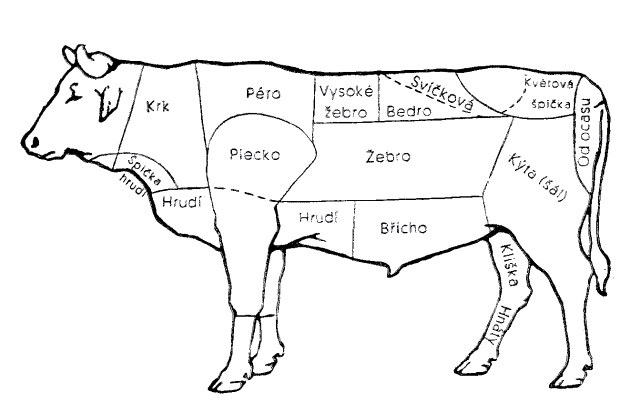
Czechs aren’t looking to the future of our planet with much hope. Only 17% feel good about what is waiting for us. Most people lean towards the opinion that life on earth in thirty years is going to be much more difficult than today.

Research data is recorded in our system, Atlas Čechů. There you will find more information, it’s all just one click away:
What will be the worst by the year 2050?

Is climate change a problem or just a bubble?
Three fourths of Czechs are inclined to believe that climate change is a real and serious problem of today. However, a visibly large difference can be seen between the sexes: as a whole, men are more sceptical of climate change. Men are twice as likely as women to say that global warming is just an inflated bubble.
In order for us to present such colourful and simple tests, we had to program our own research panel. It is called Trendaro, and we currently have over 20 thousand people registered on the site. These people regularly take part in our research, and, according to them, it’s pretty entertaining.

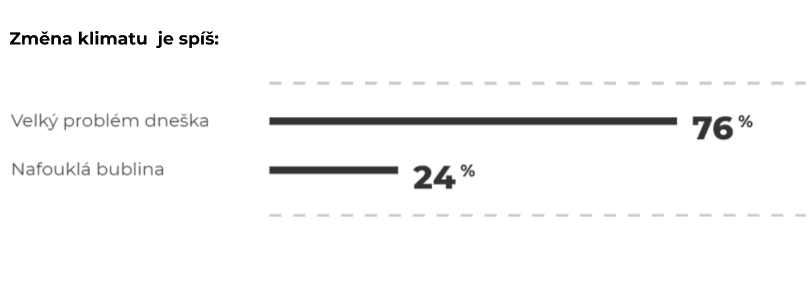
Climate change is a (an):
Opinions on climate change vary by age. The youngest people who participated in the research (ages 18-24) perceive climate change as the most important topic, but the feeling gradually decreases with age, whereas the opposite conviction that it’s just an inflated bubble grows. That, however, does not necessarily mean that the older generation has acted with less care towards the environment, nor that young people are the ones significantly “saving the planet”. In the specific manifestations of everyday life, the tendency of different age groups to prefer other options is reflected.
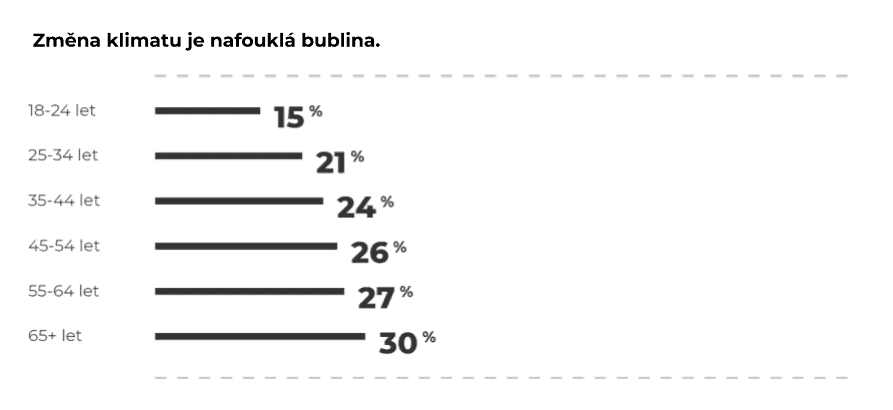
Was climate change caused by the actions of humans, or is it simply a result of natural processes?
Most of the people (60%) who think the topic of climate change is just an inflated bubble, believe it to be the result of natural processes, i.e. spontaneous phenomena that would happen with or without human interference. On the contrary, most of the people (84%) who see climate change as an issue, believe it to be the cause of human actions.
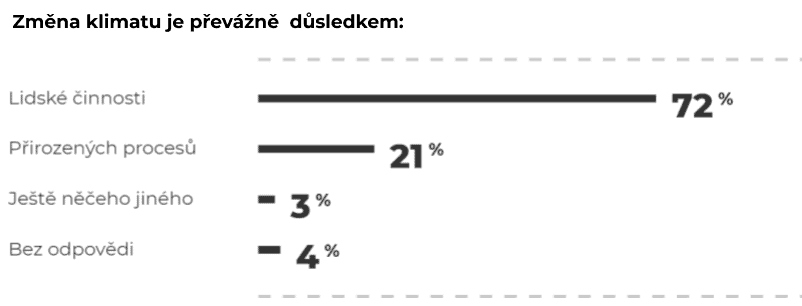
What Czechs actually (not) do for the planet
Over half of the Czech population states that the following steps can be found in their normal routine: avoiding the use of bottled water and plastic bags, bringing along their own bottle for water, prioritizing public transportation over travelling by car, saving water at home, shopping at second-hand shops, sorting their rubbish, avoiding the use of pointless packaging, limiting their overall consumption, and purchasing local food. We at Behavio, however, have never actually inspected the rubbish bins, rather people have expressed that they recycle sometimes, or they sort some of their rubbish, instead of recycling perfectly and all the time. Similarly, other examined activities need to be understood.
One fifth of Czechs sees a purpose in taking further steps to use less, however, they have yet to actually put these steps into action, even though they would like to in the future. These steps include: avoiding the use of pointless packaging and bottled water, limiting their overall consumption, purchasing food and natural cosmetics locally, and educating oneself about ecology.
If there’s one thing we do agree on as a nation, its our opinion on demonstrations about climate change. 82% of Czechs don’t participate and also aren’t planning to. Petitions promoting environmental issues are also giving rise to similar disinterest. And, of course, in a country where 49% of the population prefers Czech cuisine, there is no popular restriction on meat consumption. More than half of diners have strictly refused to offer meat less in their menus.
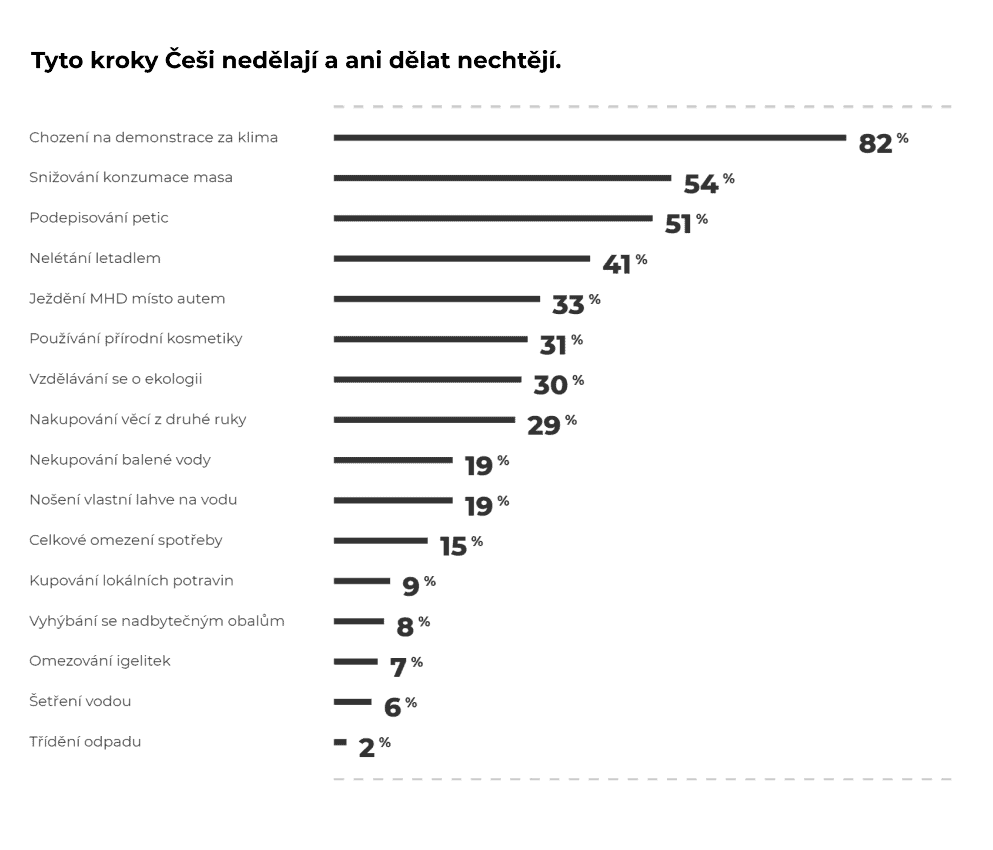
Generational differences: Young people bring along their own bottle for water, senior citizens help save the planet on different fronts
It can’t be said that one generation excelled and surpassed the other generations in all 16 of the categories we follow. Nor can it be said that they have completely neglected the others in ecology.
We uncovered the specific activities, not the motivation, why people behave the way they do. We know that older people don't take the topic of climate change as seriously, and, although they act ecologically in many respects, they may also be austerity behind it.
Vojtěch Prokeš, Director of Research
Bringing along one’s own bottle for water is a generational habit, which shows itself most often in young people, usually between the ages of 18 and 24.
Whereas, on the contrary, saving water in the home (when showing or washing dishes) is practiced by the older age groups. The shift in habits is generally best seen between the youngest and the oldest groups.
Generation Z: When compared with the other age groups, young people (18-24) neglect to sort their rubbish, reduce their consumption of meat, reduce the amount of water they use in the home, they aren’t interested in natural cosmetics, they don’t limit how much they fly, they don’t purchase food locally (which they would like to change, although they can’t afford to do so), and yet they sign petitions significantly more. They also avoid bottled water, they have become accustomed to bringing their own bottle for water with them (more than any other group), and they don’t use plastic bags (they regularly prefer to use cloth or paper bags). When it comes to the question: “Do you believe you can personally improve the state of your region?”, they answer: “Yes, and it’s worth doing.”, which puts them 11 points ahead of the other groups. This age group is by far the most optimistic in their estimation of just how much they can do for the good of the planet. In reality, however, they are helping just about the same, if not less, than the other age groups (with the exceptions of petitions, bringing their own bottled water, and cloth bags).
Retirement age (65+): They are overall more economical, which may also be motivated by their desire to save money, not just by their interest in their ecological impact. They limit their meat intake more often, and use less water in the home (91% in comparison to 82%). They take public transportation more, which a portion of them are even able to do for free. They display less willingness to learn about ecology and to sign petitions. They also do not bring their own bottle for water (only 42% in comparison to 64%). Otherwise, their behaviour does not stray too far from the average.

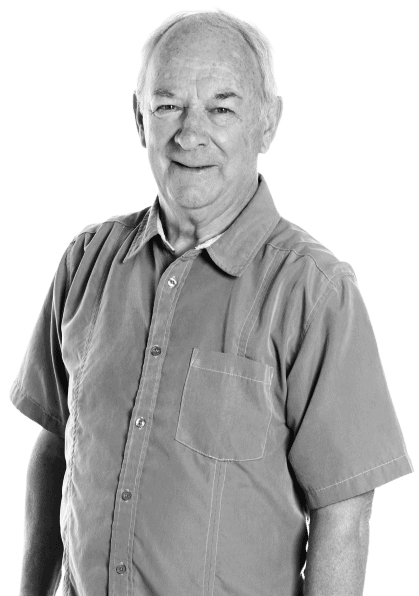
What people believe vs. how they actually act
The feeling that one is capable of influencing something, that their little drop in the bucket has some purpose on the global scale, is absolutely fundamental. At the same time, one’s behaviour and passivity depend on whether they believe climate change is a real problem or not.
The stance “I can change something” versus “I can’t do anything” has a big influence on one’s actual behaviour. Those who believe that they can change something are more active in all 16 of the ecological activities we watched. And that is a particularly central factor.
A large difference in people’s everyday lives can be seen between the two opinion groups: climate change is a problem vs. just and inflated bubble. Those who consider global warming an issue (shown in black on the graph) are more active in specific steps, they sort their rubbish more, they limit their consumption of meat… In short, higher activity permeates in all categories. They are always doing more than those who do not believe in climate change (shown in blue on the graph), and yet, they make up the overall minority (24%).
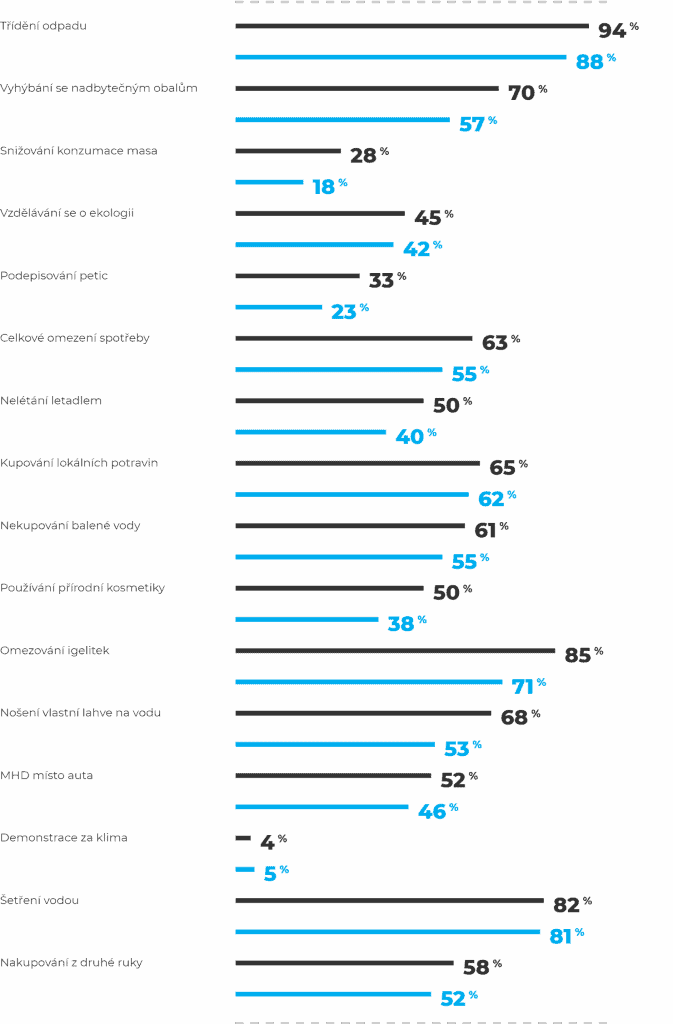
And in blue the activities of those who see climate change as a bloated bubble.
Personas
To help with understanding the topic, researchers provided the two views mentioned above – how I perceive the future of our planet and whether I think I can influence its fate – in relation to one another. They found 4 main groups of people: responsible pessimists, active optimists, resigned, and pacifists.
When it comes to taking ecological steps, “responsible pessimists” are the most active. Or, in other words, people who perceive the near future rather darkly, but aren’t yet ready to throw in the towel. On the contrary, they feel personal responsibility, and they attempt to reverse the scenario which they see as being quite probably. The next group is the “active optimists”. They are distinguishable from the others mainly due to the fact that they most often attend climate change demonstrations. Overall, however, the responsible pessimists are more interested in ecology, learning about the topic, and specific petitions. Third place is held by the “resigned” people. They feel that they themselves can’t change anything, while simultaneously believing that everything is only changing for the worse. Pacifists take part the least in the steps we follow and consider to have positive effects on the environment. These people do not believe they can do anything, but generally estimate that things will turn out okay for the Earth.
I strive to change something, even though I see the future of the planet negatively.
20% of Czechs
Usually young, college graduated women. They are active (they have many hobbies), satisfied, and happy in life. They believe they can contribute in solving the problems around them.
I can change something, and I see the future of the planet positively.
14% of Czechs
Usually men (61%) who graduated high school and are between the ages of 30 and 44. They are satisfied with their work, finances, and relationships. They are happy, they think life is going well. They attend climate change demonstrations the most out of everyone.
I can’t change anything, and I see the future of the planet negatively.
34% of Czechs
No sex, age, or education level is predominate here. They are not satisfied with their lives (with their relationships, finances). They do not believe they can contribute in solving the problems around them.
I won’t change anything, but someone else will do it for me. The planet will be saved.
26% of Czechs
Usually middle-class people, ages 65+. Conservative in their opinions, they hold traditional gender roles.
Our region is doing poorly and nobody is doing anything about it
We love our country. The only problem is our country needs more help – only 4% of Czechs think things are going great, and only 7% believe the current government and EU are making positive changes.
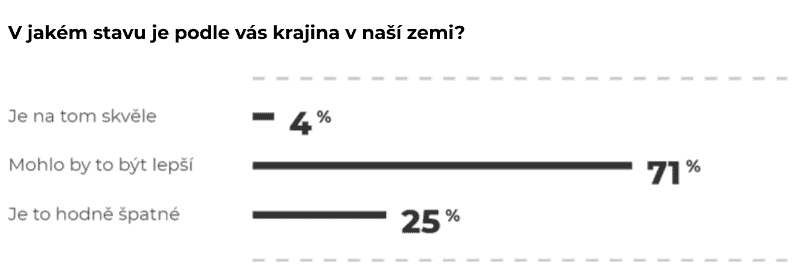
The specific problems of the Czech Republic
Respondents ranked the specific problems we asked them about into four categories: Large problem, a bit of a problem, no problem, and I don’t know.
More than half the majority thinks that nearly all of the occurrences they were asked about are serious problems. They assessed the most pressing to be chemicals and pesticides in nature, the extinction of bees, and rubbish accumulation.
Only the mining of coal do Czechs not consider a significant threat to the environment. Yet, anyone with personal experience with air pollution is more critical towards the coal industry.
We tried out another method as well. We asked the respondents what first comes to mind when they think of problems in the Czech Republic, and let them write whatever they wanted on an empty line.
This kind of question employs other parts of the brain. While the so-called "slow thinking", i.e. rational consideration, worked in determining the severity of individual phenomena, the so-called "fast thinking", i.e. subconscious, prevails when the respondents are asked to name the first thing that comes to mind. This works with pictures, symbols, and emotions.
Vojtěch Prokeš, Director of Research
Some phenomena that people consider important when presented to them don’t actually come to mind on their own. This includes, for example, the extinction of bees or the lack of drinking water. On the contrary, other issues are not given priority by people when they are competing with other topics, rather they are beaten down immediately (drought is quite common here). This is more tangible for the subconscious. It is easier for us to recall the yellow grass in our garden, our dried up well, and the nearby stream running dry than it is for us to think about drinking water and dying bees. We have only heard about these things but not actually seen with our own eyes.
The biggest problems in the Czech Republic when respondents answer spontaneously:

Experiencing drought? THAT MATTERS!
Direct personal experience with any of the problems that the Czech Republic is currently dealing with influence people’s opinions not only in terms of the environment, but also worldwide questions, such as global warming and its cause. In other words, those who no longer have enough to water the flowerbeds, believe that climate change is a real problem.
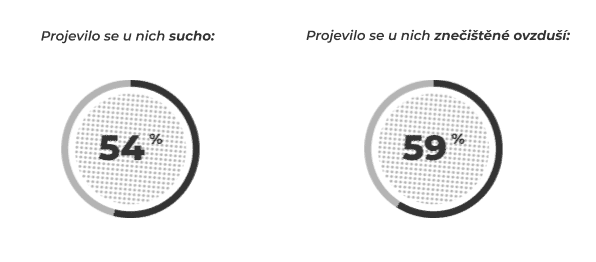
People who have experienced drought (somewhat or a lot)
- Overall, they are most pessimistic regarding the future of the planet.
- They consider climate change to be a real problem more often (83% versus 76% on average), and they believe human actions are to blame (77% versus 72% on average).
- They have a moderately more negative opinion about the state of the Czech environment.
People who have experienced air pollution (somewhat or a lot)
- Overall, they are more pessimistic regarding the future of the planet.
- They consider climate change to be a real problem more often (86% versus 76% on average), and the believe human actions are to blame (76% versus 72% on average).
- They have a significantly more negative opinion about the state of the Czech environment.
Who is going to fix the problems in the Czech Republic?
When asked the question “what are we going to do”, Czechs are basically clueless. They can’t do much on their own, and they don’t believe that the government is doing much either. Even if they believe the government is doing something, they see its actions as relatively ineffective. And Czechs expect even less from the European Union in the fight to save the environment than they do from their local garniture.
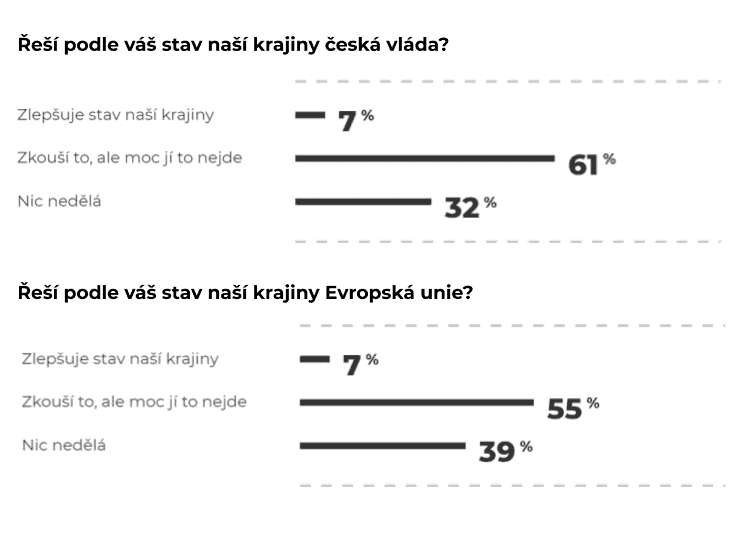
Only one third of Czechs, Moravians, and Silesians feels that they are helping in some way on their own and that it’s worth even trying to do something to improve our nature. On the other hand, 59% think that they are able to change something small. Together, the two groups make up the majority that isn’t willing to give up on “our little garden”. Those who make up the ‘absolute resigned’ group only take up 7% of the population.


